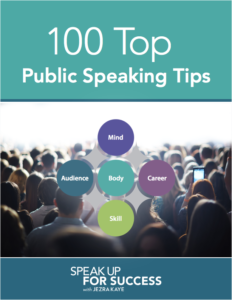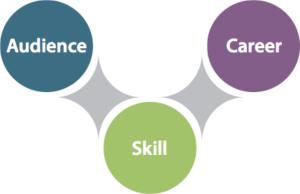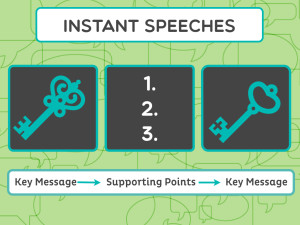I wrote an entire book about answering questions (and all other things job interview-related), and one of the most important ideas in it is this: Answer the Question First.
Why? you may wonder.
Because You’ll Relax Your Listener
Have you ever asked a question and had to wait a long time before the other person got to their answer? Chances are that the more important your question was (emotionally or logistically), the more that waiting period drove you crazy.
If, for example, you’re a client of mine and you’ve just asked for an assessment of your public speaking skill level, you probably don’t want to hear me say,
You know, I’ve been working with speaker coaching clients for more than 20 years now, and before that, I had the privilege of training a lot of instrumental musicians in how to also become working singers, which was a tremendous amount of fun, and a similar sort of process. So when you ask me to assess your skills, please understand that my answer is based on having worked with at least 1,000 individual clients, each with a different and specific configuration of strengths and weaknesses. I find, for instance, that people who have a lot of self-confidence tend to…
Whoa!! I might enjoy that pre-amble, but there’s no need for my client to hear it. My client wants me to answer the question first; for example, by saying,
Your speaking skills are excellent. I think your goal of speaking professionally is realistic, if you’re willing to do the work.
Answering the question first allows your listener to relax (because they’ve got the information they need) and then decide whether or not they want to ask any follow-up questions.
To Feel Confident that You’ve Made Your Point
When you speak at length before answering a question, your listener isn’t the only one who can get confused!
Maybe you’ll forget what you wanted to say before you get to the actual answer.
Or maybe you’ll give a good answer, but not feel confident that your listener has absorbed your main point. Being concise and not burying your main point is particularly important for media interviews, because it increases your chance of getting quoted correctly.
To avoid the stress of not knowing whether or not your point has been made, answer the question first, then check in with your listener to be sure they got it.
Based on their reaction, you can then give more context, or more details, or answer follow-up questions, or just stop talking.
To Give Yourself Flexibility
By a strange and wonderful coincidence, the statement you make when you answer the question first is generally the most important thing you have to say — in other words, your key message.
Your key message is the basis of a short instant speech.
This means that, when you answer the question first, you can either stop after that answer, or — if your audience wants to hear more — roll right into a concise and professional-sounding discussion; for example:
Your speaking skills are excellent. I think your goal of speaking professionally is realistic, if you’re willing to do the work.
- You could get better at making Instant Speeches, so that you’re more secure when speaking off the cuff;
- Your body language isn’t quite focused. We should work more intensively on how you move; and
- I’d like to see you having more fun. You’re overly serious, which can put off an audience, plus you deserve to enjoy yourself.
But those are relatively minor points. The bottom line is, your speaking skills are excellent, and you can achieve your goal of speaking professionally, if you’re willing to do the work.
“But What If I’m Not Ready To Answer the Question First?”
Now we’re at the heart of the matter. Lots of people talk around and around a question because they don’t feel confident in their ability to answer it.
Rather than trying to fool your listeners into thinking you’re answering, or to put off answering while you wait for inspiration to strike, consider making the following statement:
That’s a great [interesting / important / different] question, and I wish I had an answer for you, but I don’t. If you’d like, I can look into what you’re asking and get back to you.
A truthful statement like that one is a more-than-valid way to answer the question first. (Here are other approaches to answering when you don’t know the answer.)
It’s perfectly reasonable that you don’t know a particular answer — and if you say so with confidence, your listeners will accept that fact and move on to what you do know.
In other words, answering the question first is a sign of confidence and authority… even when you don’t know the answer!
 Buy 100 Top Public Speaking Tips: The Book!
Buy 100 Top Public Speaking Tips: The Book!
In 25 years of speaker coaching, I’ve helped my individual speaker coaching clients develop their strengths and skills to become authentic and effective communicators.
Along the way, I’ve developed tips for everything from small talk to speaking up in meetings, from managing fear to making an impact.
And now, I’ve shared it all in 100 Top Public Speaking Tips: The Book. This beautifully designed PDF booklet is searchable, clickable, and categorized, so that you can find what you need, instantly.



